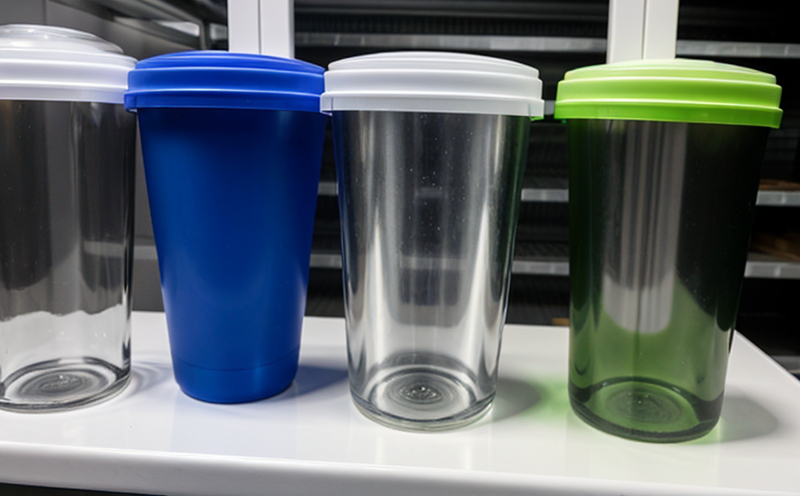ISO 1103-2 Annealing Point Verification
The ISO 1103 series of standards provides a comprehensive approach to testing annealed glass containers, with ISO 1103-2 specifically focusing on the verification of the annealing point. This service is crucial for quality assurance and compliance in the packaging sector, ensuring that glass containers are manufactured within acceptable thermal stress parameters.
The annealing process in glass manufacturing involves heating the material to a temperature above its strain point and then cooling it slowly enough so that internal stresses relax without causing deformation. The annealing point is the temperature at which this process is achieved. Verification of this point ensures that the glass containers can withstand thermal shock without fracturing, thereby enhancing product safety.
During the test, a specimen from an actual production batch undergoes heating to its specified annealing point and then undergoes cooling in a controlled environment according to ISO 1103-2. The process is designed to simulate real-world conditions that glass containers may encounter during shipping and storage.
The testing apparatus typically includes a furnace capable of precise temperature control, thermocouples for accurate temperature measurement, and a cooling chamber or water bath to ensure gradual cooling. Once the specimen reaches its annealing point, it is slowly cooled back down to ambient temperature.
Accurate verification of the annealing point ensures that glass containers do not undergo thermal shock during filling, storage, or distribution, which could lead to catastrophic failure. This test aligns with industry best practices and helps maintain product integrity and customer satisfaction.
The acceptance criteria for this test are based on international standards, including ISO 1103-2:2019. The specific parameters include the temperature range at which the annealing process is conducted, the rate of cooling, and the duration of holding time at the annealing point.
Compliance with these standards not only ensures product quality but also supports regulatory requirements for glass packaging in various industries. By adhering to ISO 1103-2, manufacturers can demonstrate their commitment to safety and reliability, which is essential for maintaining a positive brand reputation and meeting customer expectations.
For R&D engineers and quality managers, this test provides critical insights into the thermal properties of glass containers, enabling them to optimize production processes and improve product performance. It also serves as an important tool in ensuring that new designs meet safety standards before being introduced to the market.
Quality and Reliability Assurance
The ISO 1103-2 annealing point verification test is a cornerstone of quality assurance for glass packaging. By accurately verifying the annealing point, manufacturers can ensure that their products are safe and reliable, meeting both internal standards and external regulatory requirements.
This service plays a critical role in reducing product failures due to thermal shock, which can lead to costly recalls and reputational damage. It also helps in identifying any inconsistencies in the manufacturing process, allowing for timely adjustments and improvements.
For procurement officers, this test provides peace of mind by ensuring that suppliers meet stringent quality standards. By choosing a laboratory that offers ISO 1103-2 annealing point verification, they can be confident that their supply chain is reliable and meets the highest industry standards.
The results of this test are typically reported in detailed certificates or reports, which can be used for internal documentation, regulatory submissions, and client presentations. These documents serve as a clear indication of compliance with international standards and the reliability of the product.
Use Cases and Application Examples
This test is particularly valuable in sectors where glass packaging plays a critical role, such as pharmaceuticals, food and beverage, and cosmetics. In these industries, ensuring that glass containers are free from thermal stress is paramount to maintaining product integrity and safety.
For example, in the pharmaceutical industry, glass vials used for injectable drugs must be able to withstand repeated sterilization cycles without cracking or degrading. The ISO 1103-2 annealing point verification test ensures that these containers meet the necessary thermal stability requirements.
In the food and beverage sector, glass bottles and jars are often subjected to high temperatures during pasteurization or hot filling processes. Proper annealing ensures that these containers can endure such conditions without failure, protecting both the product and the consumer.
The cosmetic industry also relies heavily on glass packaging for its products. From serums to lotions, many beauty items are stored in glass containers due to their perceived quality and safety. Ensuring that these containers meet thermal stress requirements is crucial to maintaining brand reputation and customer trust.
Why Choose This Test
- Ensures compliance with international standards for glass packaging testing.
- Promotes product quality and reliability through precise verification of annealing point.
- Aids in optimizing production processes to enhance thermal resistance.
- Supports regulatory requirements in various industries, ensuring safety and integrity.





